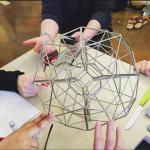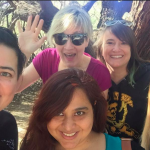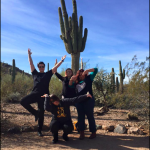Time is magical. Time to think, talk, and play. Time with movement, sunshine, and one another. Of all the resources that I need in order to do my work, the one I need most is time.
In general, I can use more of this magical thing called time. But this post isn’t about lack, it’s about a brief window of abundance. The Human Security Collaboratory, which I co-founded this year with Jessica Rajko, has been generously supported by the Global Security Initiative here at ASU. Our very first event was the recent Feminists Retreat, in which we brought together scholars from India, Canada, and the U.S. to spend four days together in a little house thinking about wearables, digital + analog making, and algorithmic cultures.
We ate together, wrestled with ideas and objects together, shared stories, and spent time attending to our bodies together. We walked and talked, hacked and yacked, giggled and guffawed together. What emerged is a robust future research agenda, stronger insights about our different local contexts and disciplinary practices, a deep respect for one another’s expertise along with avenues for collaboration, and, from my perspective, a really interesting model of what it might mean to foster international, transdisciplinary research and activism. It’s not a new model, but it was new experience for me and one that aligns more closely with my research, writing, and teaching commitments.
As scholars, artists, and activists committed to understanding the interfaces between bodies, technologies, and cultures we foregrounded our bodies and the many bodies intertwined with wearable technologies and algorithmic thinking. One of our conversation topics featured a favorite maxim: there is no data without bodies. I think we spent a fair amount of time reaffirming that there is no research, no activism, no change without bodies. What’s more, there might not be sustainable research, activism, and change without one another. I’m grateful for the time and here’s to finding more ways to do the work together.


